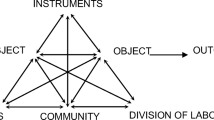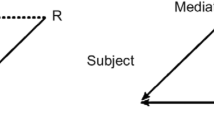ABSTRACT
From the sociocultural perspective, this research utilized activity theory as the theoretical framework to analyze the influences of cultural factors for Taiwanese Atayal junior high school students’ study in mathematics. The research methodology adopted grounded theory, theoretical and methodological approaches which are illustrated through episodes from a study of the mathematics teaching and learning in a year-13 class, where Atayal students were considered as “lower achievers” in their year group. We show a way to address complexity in the activity of learning and its development based on recognition of central cultural factors in mathematics teaching–learning by the use of the activity system. Analysis through this systematic network can reveal the factors influencing Atayal students’ learning of mathematics under their cultural background. The tension between Atayal culture’s speech representation system and Chinese culture’s literal representation system causes Atayal students difficulties in carrying out the transformation of representations. Tension formed between Atayal students’ holistic thinking style and the analytic thinking style presented in teaching material and teaching activities is unfavorable to their understanding of mathematical concepts. From a teaching practice perspective, Atayal students can be more actively involved in mathematics learning activities when the tension between the teaching/learning systems is considered. As for the theoretical structure, the analysis structure of classroom activity and the design of teaching activities developed from a sociocultural orientation and activity theory can indeed improve Atayal students’ mathematical learning within the cultural stream.
Similar content being viewed by others
Re ferences
Cole, M. (1996). Cultural psychology: A once and future discipline. Cambridge, MA: Harvard University Press.
Cole, M. & Engeström, Y. (1993). A cultural–historical approach to distributed cognition. In G. Salomon (Ed.), Distributed cognitions: Psychological and educational considerations (pp. 1–46). New York: Cambridge University Press.
Cummins, J. (1986). Empowering minority students: A framework for intervention. Harvard Educational Review, 56(1), 18–36.
Daniels, H. (2001). Vygotsky and pedagogy. London: Routledge Falmer.
Engeström, Y. (1987). Learning by expanding: An activity-theoretical approach to developmental research. Helsinki, Finland: Orienta-Konsultit Oy.
Engeström, Y. (1998). Reorganising the motivational sphere of classroom culture: An activity-theoretical analysis of planning in a teacher team. In F. Seeger, J. Voigt & U. Waschescio (Eds.), The culture of the mathematics classroom (pp. 76–103). Cambridge, UK: Cambridge University Press.
Engeström, Y. (1999). Activity theory and individual and social transformation. In Y. Engeström, R. Miettinen & R.-L. Punamaki (Eds.), Perspectives on activity theory (pp. 19–38). New York: Cambridge University Press.
Engeström, Y. (2001). Expansive learning at work: Toward an activity theoretical reconceptualisation. Journal of Education and Work, 14(1), 133–157.
Engeström, Y. & Cole, M. (1997). Situated cognition in search of an agenda. In J. A. Whitson & D. Kirshner (Eds.), Situated cognition. Social, semiotic, and psychological perspectives (pp. 301–309). Hillsdale, NJ: Lawrence Erlbaum.
Engeström, Y. & Middleton, D. (1996). Introduction: Studying work as mindful practice. In Y. Engeström & D. Middleton (Eds.), Cognition and communication at work (pp. 1–14). New York: Cambridge University Press.
Evan, R. & Schwarz, B. B. (2003). Implications of competing interpretations of practice for research and theory in mathematics education. Educational Studies in Mathematics, 54(2,3), 283–313.
Geertz, C. (1973). The interpretation of culture. New York: Basic Books.
Gilliand, H. (1999). Teaching the Native American. Dubuque, IO: Kendall Hunt.
Hughes, P. & More, A. J. (1997, December). Aboriginal ways of learning and learning styles. Paper presented at the Annual Conference of the Australian Association for Research in Education Brisbane. From: http://www.aare.edu.au/97pap/hughp518.htm
Jaworski, B. & Potari, D. (2009). Sociocultural complexity in mathematics teaching. Educational Studies in Mathematics, 72(2), 219–236.
Kozulin, A. (1996). Vygotsky in context. In A. Kozulin (Ed.), Thought and language (pp. xi–lvi). Cambridge, MA: The MIT Press.
Leap, W. L. (1988). Assumptions and strategies guiding mathematics problem solving by Ute Indian students. In R. R. Cocking & J. P. Mestre (Eds.), Linguistic and cultural influences on learning mathematics (pp. 161–186). Hillsdale, NJ: Erlbaum.
Leont’ev, A. N. (1978). Activity, consciousness, and personality. Englewood Cliffs, NJ: Prentice-Hall.
Leont’ev, A. N. (1981). The problem of activity in psychology. In J. V. Wertsch (Ed.), The concept of activity in Soviet psychology. Armonk, NY: Sharpe.
Pewewardy, C. D. (2002). Learning styles of American Indian/Alaska native students: A review of the literature and implications for practices. Journal of American Indian Education, 41(3).
Strauss, A. & Corbin, J. (1998). Basics of qualitative research: Grounded on theory procedures and techniques (2nd ed.). London: Sage.
Van Oers, B. (2001). Educational forms of initiation in mathematical culture. Educational Studies in Mathematics, 46, 59–85.
Vygotsky, L. S. (1962). Thought and language. Cambridge, MA: MIT Press.
Vygotsky, L. S. (1978). Mind in society: The development of higher psychological processes. Cambridge, MA: Harvard University Press.
Wertsch, J. V. (1985). Vygotsky and the social formation of mind. Cambridge, MA: Harvard University Press.
Wertsch, J. V. (1991). Voices of the mind: A sociocultural approach to mediated action. Cambridge, MA: Harvard University Press.
Author information
Authors and Affiliations
Corresponding author
Rights and permissions
About this article
Cite this article
Huang, CH., Lin, FL. USING ACTIVITY THEORY TO MODEL THE TAIWAN ATAYAL STUDENTS’ CLASSROOM MATHEMATICAL ACTIVITY. Int J of Sci and Math Educ 11, 213–236 (2013). https://doi.org/10.1007/s10763-012-9381-9
Received:
Accepted:
Published:
Issue Date:
DOI: https://doi.org/10.1007/s10763-012-9381-9




